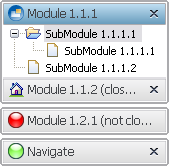Notice: This Wiki is now read only and edits are no longer possible. Please see: https://gitlab.eclipse.org/eclipsefdn/helpdesk/-/wikis/Wiki-shutdown-plan for the plan.
Difference between revisions of "Riena/Navigation"
< Riena
(→Module Groups, Modules and Submodules) |
(→Module Groups, Modules and Submodules) |
||
| Line 10: | Line 10: | ||
== Module Groups, Modules and Submodules == | == Module Groups, Modules and Submodules == | ||
| − | |||
| − | |||
Each subapplication may contain multiple module groups, each module group may contain multiple modules and each module may contain multiple submodules. | Each subapplication may contain multiple module groups, each module group may contain multiple modules and each module may contain multiple submodules. | ||
Revision as of 11:19, 3 December 2008
The goal of the Riena navigation concept is to make navigation as easy and comfortable as possible for the enterprise user.
Subapplications
The Riena application ist made up from possibly multiple subapplications identifyable by the handles in the top area of the application window.
Module Groups, Modules and Submodules
Each subapplication may contain multiple module groups, each module group may contain multiple modules and each module may contain multiple submodules.


